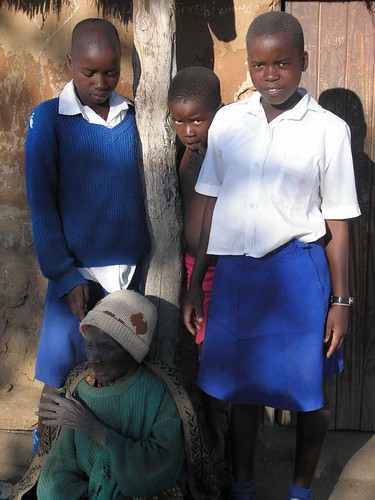A few weeks ago we were in the south of Zimbabwe near the Botswana border. We drove through a rural area and visted a family comprised of four children, the oldest being 13, and their extremely old Gogo (grandmother). When I asked how old their Gogo was, they said 110, but who knows. She seemed extremely old and frail. She was also blind, which meant that in many ways she wasn't able to be the primary care giver for these children. So, the 13-year-old girl was the head of this family.

This puts the children in a very vulnerable situation as they have no money for school fees, uniforms or food. If someone supports them by paying for their school fees (such as super Salvo Max Vincent), do they choose to farm for food, or get an education? They are also at risk for abuse and exploitation by members of the community.
We didn't know what to do, so we bought them some food. So that helps them for a few days, but what then? Is that really a sustainable response? What happens next? Who is there to help them with their next meal? The hope is to offer sustainable assistance, such as helping with irrigation and farming. That offers them some independence and a way to feed themselves. But in this case, cows and goats grazed through their vegetables and maize while the kids were at school. With a 3-4 km walk in either direction, it makes it difficult for them to be school kids and farmers.
This week I visited a seniors' home that has been hard hit by inflation (over 1,200 percent), the economy and lack of funding. They're only working at less than half of capacity as they can't afford to admit any more residents. But sadly, they haven't enough resources to adequately feed the residents. So old people are starving to death and there's little anyone can do. I think nine have starved to death in the last month or two. They could shut down completely, but then the residents would be in worse shape as there is nowhere else for them to go. So they keep on hoping to help as best they can. The Salvation Army brought some food and soap but that will only last a week. What's the solution? How do we help in a feasible long-term way?
This is what we experience. Sometimes just the street kids surrounding us on our lunchtime walks, most of them too young to be living that kind of life. Other times the tragic reality that the marginalized are really suffering in this country. God calls each of us to look after orphans and widows in their distress. But it's a lot easier to take a Canadian kid to McDonald's and pray for them than to watch so many suffering here and have little idea how to truly help them.
3 comments:
Hi from BC...I agree, Max is a super salvo, God bless him! God bless you guys also for being just as great b/c not only did you give food to this family, by being there in those moments you brought Jesus.
deana z
It brings me to tears to think of what you are seeing there. God has blessed you with so much compassion for these people and that may be more than what they get from anywhere else. It may seem like a hopeless situation and there are no immediate, quick-fix things to do to remedy that. There are no easy answers and nothing I can say to encourage you will accurately capture the actual situation, since I haven't got a clue what that is.
What I will say is, may God continue to bless you. May you see hope, in spite of the hopelessness that surrounds you. May He continue to make His presence known to you and through you.
Every little action counts for something. You can't do everything, but you can do something. If everyone just does something, we can work together to bring some hope into this hopelessness.
We love you.
Christina
You are trying. What more can you do? If you don't try you don't find out that the vege garden gets trampled / eaten, and you can't work past that.
Post a Comment